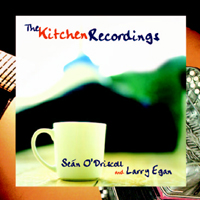 Alistair Brown contributed this review.
Alistair Brown contributed this review.
The title of the album says it all; this recording of Irish music on banjo or bouzouki and button accordion was recorded in the O’Driscoll kitchen on a Sony four-track recorder. That is not, I hasten to add, a comment on the technical quality of the production, which is for the most part exactly what it should be. Rather, it reflects what we have: the old tunes, admirably cranked out by two competent players who know their way up and down and over the back of their instruments, playing as for a group of friends squeezed into a small, cozy and sociable space. There are no fancy studio tricks here, just a well-chosen and well-balanced selection of jigs, reels and hornpipes, and one slow air – Irish music as it is meant to be.
Both musicians come by their skills honestly. Seán O’Driscoll, from Cork, comes from a family long established in Irish traditional music, and has been playing tenor banjo since his teens. Much of his musical career has been spent in the USA, playing with luminaries such as Paddy O’Brien, Daithi Sproule, James Keane and Liz Carroll. He also plays button accordion, guitar and mandolin. Larry Egan, from County Wicklow, has been playing button accordion since he was 10. By the time he was 18, he had collected four All-Ireland solo titles. Much of his playing has been finely honed in the Saturday night sessions in the family pub.
This is very much ensemble playing featuring the two instruments. The tenor banjo follows the melody line religiously; each note is assiduously picked out. With this instrument, there is nowhere to hide and only the competent need apply. Both instruments lead, the accordion occasionally filling out the tune with the burst of a chord or a pulse on the left hand. For those unaccustomed to the tenor banjo played in the Irish style, or more accustomed to its use as a rhythm instrument backing the melody, this is an introduction to an entirely new sound.
With instruments like the banjo or bouzouki, there is always an inherent danger of the pace getting out of control — something to do with the staccato nature of the beast, I suppose. Happily there is no danger of that in the hands of Seán O’Driscoll. The rhythm is nicely restrained throughout, and there is no pushing the pace. One never gets a sense of the accordion chasing the banjo, as can sometimes happen. Occasionally triplets get on the verge of being out of control, but overall, the banjo anchors the tune in a very satisfying way. We hear the banjo used in a very different way in the air, “An Goban Saor,” here complemented by the bouzouki. The tune is sparing, the notes hang suspended in the air, arriving home satisfyingly on cue, like the balls of a juggler.
Egan’s box playing is masterful. The accordion positively pulsates in his rendition of Billy McComiskey’s “The Palm Tree.” Reels such as “Eddie Kelly’s” and “The Culfadda” bounce with energy, while there is a nicely competent control to the playing of slow reels and the hornpipe set, “Sliabh na Mban” and “The City of Savannah.” Mick Daly joins the accordion on guitar in one set, producing a sound that is in direct contrast to the others, and occasionally spoons and bodhran pop up.
The notes are comprehensive and informative, in both English and Gaelic. The tunes and their sources are extensively documented, and there is a detailed biography of both musicians, with appropriate nods in the direction of those who taught and influenced them. Uncredited in otherwise comprehensive notes, however, is what sounds like a Jew’s harp in one track. Or perhaps it was the toaster.
Lovers of traditional Irish music and aspiring players should clear a space in their libraries for this CD, both to admire the clean exemplary playing and to enjoy a selection of good session tunes, and of some of the better recent compositions. The Cló Iar-Chonnacht website gives information about this recording, as well as a broad range of links for those looking for information on other aspects of Irish culture. https://www.cic.ie/en/
(Cló Iar-Chonnacht, 2003)
